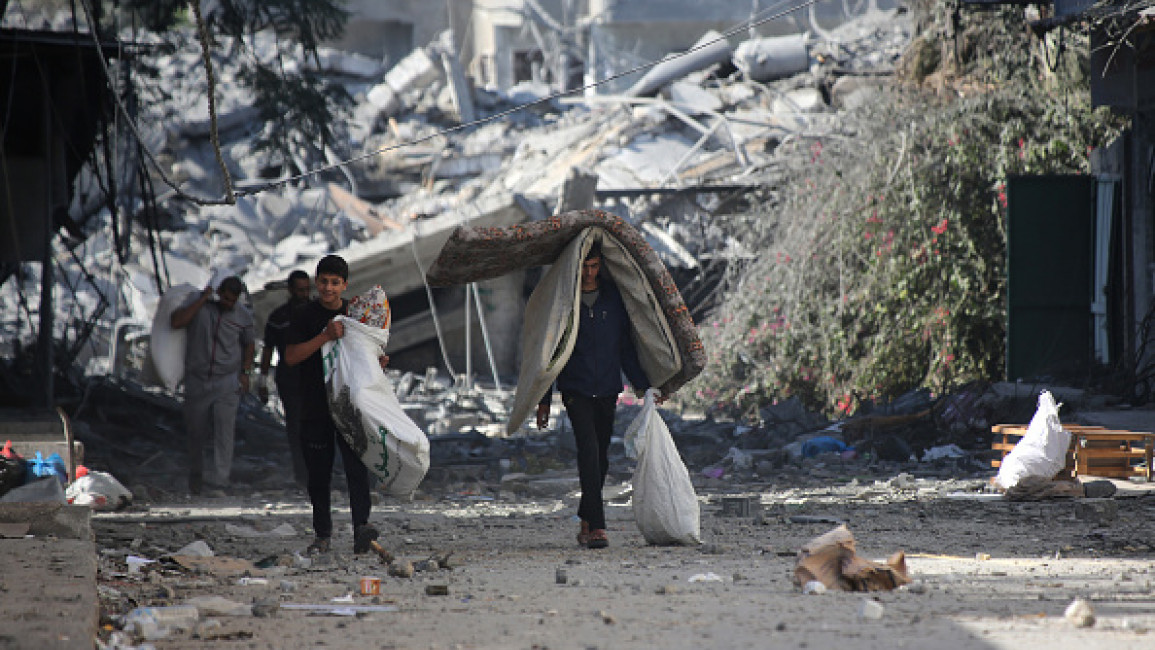Truce, hostage release delayed until at least Friday, despite Israel-Hamas deal
Israel said a four-day Gaza truce and hostage release will not start until at least Friday, stalling a breakthrough deal to pause the war in the battered territory.
Israeli national security adviser Tzachi Hanegbi indicated the release of at least 50 Israeli and foreign hostages held by Hamas was on track, but would not happen on Thursday as expected.
"The contacts on the release of our hostages are advancing and continuing constantly," he said in a statement.
"The start of the release will take place according to the original agreement between the sides, and not before Friday."
A second Israeli official said that a temporary halt in fighting would also not begin on Thursday.
The delay is a hammer blow to two million-plus Gazans praying for an end to 47 days of war and deprivation, which has seen over 14,000 killed by Israeli strikes, as well as the cutting of food, water and fuel in the territory.
An elderly Israeli hostage who was released by Hamas said she was treated well during her 2wk captivity. While she first went "through hell" after being beaten by militants when she was abducted & taken to Gaza on 7 Oct, once inside, she said she and others were well looked after pic.twitter.com/Bz2pgOoQDv
— The New Arab (@The_NewArab) October 25, 2023
The complex and carefully choreographed deal saw Israel and Hamas agree a four-day truce, during which at least 50 hostages taken in the Palestinian militant group's surprise October 7 attack would be released.
For every 10 additional hostages released, there would be an extra day's "pause" in fighting, an Israeli government document said.
Three Americans, including three-year-old Abigail Mor Idan, were among those earmarked for release.
In turn, Israel would release at least 150 Palestinian women and children and allow more humanitarian aid into the besieged coastal territory after weeks of bombardment and heavy fighting.
It was not immediately clear what caused the delay in the deal that resulted from weeks of talks involving Qatar, Egypt and the United States.
The agreement has been approved by Hamas leaders and by Israel - despite fierce opposition from some within Prime Minister Benjamin Netanyahu's extreme right-wing government.
Controversial minister for National Security Itamar Ben-Gvir described the deal as a "historic mistake" that would embolden Hamas and risk the lives of Israeli troops.
Netanyahu, however, has backed the agreement with Hamas, but vowed the truce will be temporary and will not end the campaign to 'destroy' the Palestinian group.
"We are winning and will continue to fight until absolute victory," he said on Wednesday.
In Washington, the White House said President Joe Biden had spoken to Netanyahu on Wednesday and "emphasised the importance of maintaining calm along the Lebanese border as well as in the West Bank."
The White House has pressed Israel not to escalate clashes with Lebanese militant group Hezbollah, for fear of sparking a war that could drag in US and Iranian forces.
Biden also spoke to the leaders of Qatar and Egypt Wednesday, as he pushed for the truce to be "fully implemented" and to "ultimately secure the release of all hostages."
In the Red Sea, US Central Command on Thursday said the USS Thomas Hudner had "shot down multiple one-way attack drones launched from Houthi controlled areas in Yemen" - referencing another Iran-backed militia group.
Israel's list of eligible Palestinian prisoners included 123 detainees under 18 and 33 women, among them Shrouq Dwayyat, convicted of attempted murder in a 2015 knife attack.
"I had hoped that she would come out in a deal," her mother, Sameera Dwayyat, said, but added that her relief was tempered by "great pain in my heart" over the dead children in Gaza.
In Khan Younis, southern Gaza, displaced Palestinians remained sceptical about the Israel-Hamas deal.
"What truce are they talking about? We don't need a truce just so aid can come in. We want to go home," said Maysara Assabagh, who fled northern Gaza for a hospital that now shelters about 35,000 displaced people.
Large parts of Gaza have been flattened by thousands of air strikes, and the territory faces shortages of food, water and fuel and other essentials.
For now, Israel appeared to be pushing on with its offensive in northern Gaza, with witnesses reporting strikes on Kamal Adwan hospital and nearby homes.
Medical workers treated bloodied, dust-covered survivors as other residents fled through debris-strewn streets to safety.



